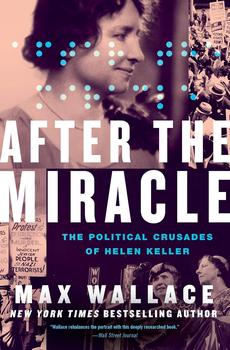Summary | Excerpt | Reviews | Beyond the Book | Readalikes | Genres & Themes | Author Bio

The Political Crusades of Helen Keller
by Max Wallace
By the time he returned home for good seven years later, his accolades had received widespread attention from the media back home and Howe had earned the moniker "Lafayette of the Greek Revolution." Boston seemed his for the taking— a far cry from the undistinguished laggard who set sail fresh out of school. And yet, the young man returned disillusioned — unimpressed by his own heroics and the success of the revolution, which resulted in the Treaty of Constantinople, establishing Greek independence in 1832.
No closer to deciding on a vocation, his life's work came about through a fortuitous encounter with an old medical school classmate, Dr. John Dix Fisher, who had been a year ahead of Howe at Harvard. On a journey to Paris a few years earlier, Fisher had visited the Institut National des Jeunes Aveugles, the world's first formal school for the blind, founded in 1784 by Valentin Haüy. By showcasing the art and music of blind children, the French educator had aimed to impress the public with the children's abilities rather than inspire pity for their condition. The school had also experimented with a new technique called raised type using embossed letters to teach its students to read, though this system would later be replaced by a tactile system of raised dots developed by one of its teachers, Louis Braille. Upon his return to America, Fisher resolved to establish a similar school in the United States. Appealing to the Massachusetts legislature, he had already received a state charter for his proposed school but had made no progress in finding the right person to head the institution until he ran into Howe on a stroll with two fellow trustees in 1831 and decided on the spot that he was their man.
In colonial America, the care of people with disabilities had often been considered a local responsibility. Many towns established "poor farms" and almshouses to support citizens whose families could not cope with their care. Under this system, however, people with disabilities were often associated with criminals and paupers, collectively considered undesirable populations who could acceptably be segregated from "polite society" in overcrowded and unsanitary conditions with a mini-mum of care. Eventually, people with physical or cognitive disabilities were often sent to "lunatic asylums" to be contained, rather than cared for. By the beginning of the nineteenth century, the concept of "moral treatment" had been imported from Europe and more humane practices were employed to "treat" people with disabilities, who had come to be known as the "woefully afflicted."
Until Samuel Howe took the reins of the New England school, the education of blind children was often restricted to wealthy families who could afford to hire tutors. Howe was determined to change that. Drawing from his considerable experience on behalf of Greek independence, he devoted his days to soliciting funds to ensure that blind people would no longer be treated as a "pauper class." "Blindness," he wrote in his first report, is "one of those instruments by which a mysterious Providence has chosen to afflict man ... Much can be done for them ... you may light the lamp of knowledge within them, you may enable them to read the Scripture themselves." The latter sentiment was especially characteristic of the arguments that reformers of his era used to extol the virtues of educating blind people — the idea that such an education would enable them to "receive" Christianity.
Having secured permission from the trustees to travel abroad for several months to investigate European practices in the field, Howe returned to Boston in July 1832 unimpressed by what he had discovered. He was especially distressed to learn that fewer than 5 percent of the graduates of these schools could earn a living upon graduation. Many ended up begging or were institutionalized in asylums for the indigent. Instead of receiving the tools to function in society, he lamented, blind people were treated as "mere objects of pity." He was determined that his school would enable them to integrate into society free from the stigma of dependence.
Excerpted from After the Miracle by Max Wallace. Copyright © 2023 by Max Wallace. Reprinted with permission of Grand Central Publishing. All rights reserved.
If passion drives you, let reason hold the reins
Click Here to find out who said this, as well as discovering other famous literary quotes!
Your guide toexceptional books
BookBrowse seeks out and recommends the best in contemporary fiction and nonfiction—books that not only engage and entertain but also deepen our understanding of ourselves and the world around us.